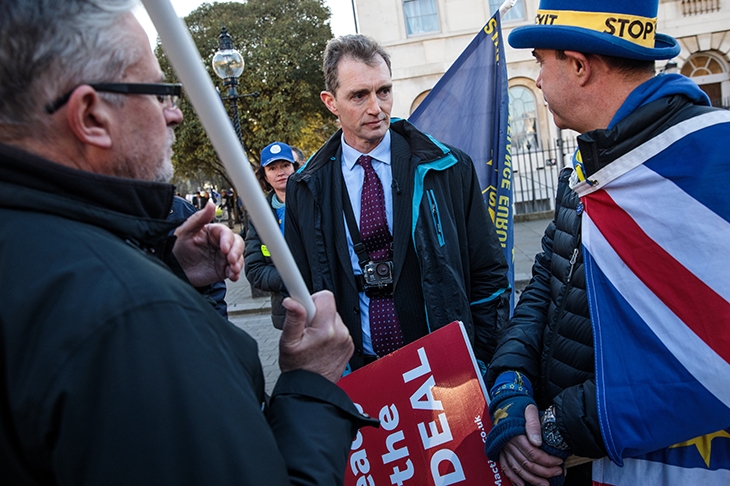Did you see the Welsh Tory MP David Davies and a pro-Brexit protester arguing outside parliament, pointing cameras at one another? Davies was being interviewed for BBC Wales about why he had taken to wearing a body camera. Having been on the receiving end of abuse from both pro- and anti-Brexit protesters, he said he did it for his protection.
As chance would have it, one such protester — a hard-right social-media activist — was walking past, doing a live-stream to her followers. The protester who challenged Davies goes by the name Based Amy, or the Bacon Lady (don’t ask), and is part of a small association of hard-right agitators who have taken to haranguing people in Westminster. They first hit the headlines in January when one of their number, James Goddard, was arrested after he confronted anti-Brexit MP Anna Soubry on camera and allegedly called her a Nazi.
Based Amy spotted Davies and pointed her phone at him. He noticed, stopped the interview and switched his bodycam on. She called him a traitor and a snowflake as all three cameras rolled.
It was about as depressing an insight into modern life as I have seen. We live in such a distrustful society now. George Orwell’s Nineteen Eighty-Four, published 70 years ago this month, depicted a world of near total surveillance by the state. In today’s Britain, we live under a different type of tyranny. We use our smartphones to record ourselves and each other all the time.
MPs and protesters filming one another is no doubt symptomatic of the distrust which has long been brewing between politicians and the people. It has become a political tactic. It’s also a business of sorts for the protesters: the aim is to go viral and rake in donations from your supporters.
But that bizarre clip also points to some more subtle, but no less malign, trends. It’s politically useful to become a victim, so these sorts of protesters film everything in the hope of capturing the moment they are crushed by the jackboot of the state. (There are a couple of videos of Based Amy dramatically falling over after the lightest of nudges from law enforcement.) Even the slightest of run-ins can burnish your victim status and score points against political opponents. It may sound deranged, but this practice is far more mainstream than we might like to admit.
Outside the big Brexit party rally in London last week, for instance, Farage supporters chucked water at the Remain campaigner Femi Oluwole, called him a traitor and waved a Union Jack in his face. Naturally, Oluwole captured it all on camera. In the viral clip of the incident, he keeps turning to his camera person, and saying: ‘Did you get it?’
All this selfie-surveillance doesn’t just record what is happening; it changes it. We are the subjects of our own experiment. We know we are being watched, and we act differently. People begin to act out an exaggerated role for the delectation of social media.
Forty years ago, in her collection of essays On Photography, Susan Sontag argued that we had begun to ‘prefer images to real things’ and that the camera had become the ‘device that makes real what one is experiencing’.The advent of camera-phones and the internet has only exacerbated this tendency. People go to concerts and watch the whole performance through their iPhone screens. An undocumented holiday might as well not have happened. Whenever some violent disagreement kicks off in public these days, people seem to hit record before they intervene.
In January, a man began ranting about immigrants and feminists in Brixton McDonald’s. If ever there was a time and a place to milkshake someone, this was it. But most of the onlookers either ignored him, or filmed him, goading him to perform for the camera.
Even grimmer was the response of bystanders to the murder of Lee Rigby on the streets of Woolwich, six years ago last week. While three courageous women confronted his jihadist killers, a far bigger crowd of onlookers began live-tweeting, photographing and videoing the incident.
Michael Adebolajo, one of the killers, gave a full-blown press conference — his hands covered in Rigby’s blood, brandishing the meat cleaver he had just used to try to take his head off — to one of the witnesses who was filming the scene.
None of us can know what we would do in a situation like that. But filming a murder unfold is not a sign of fear, it is a sign of detachment. Even when a man is being hacked to death, our first instinct is to record; to tell people we were there.
We’re told that technology is rewiring our brains, feeding our worst prejudices and making us vote for politicians we should consider beyond the pale. But the bitter truth is that no one is forcing us to document absolutely everything. There is no clever algorithm or devious Silicon Valley design that makes us reach for our iPhones.
The tyranny of selfie-surveillance suggests that something is deeply wrong with us; that we can’t process reality without the validation of others. We overshare constantly, yet have never been more atomised. No one knows their neighbour, but everyone knows what they had for lunch.
Perhaps this is all an expression of some profound shift in how we relate to ourselves and to one another. Whatever it is, it comes from us. We love Little Brother.







Comments